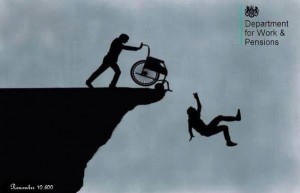
The growth of zero hours contracts is making it even harder for disabled workers to secure the reasonable adjustments they need to do their jobs, “valuable” new research suggests.
Employers are displaying a “strong reluctance” to make reasonable adjustments for disabled workers on zero hours contracts, despite their duty to do so under the Equality Act, according to the research by Rupert Harwood, from the University of Greenwich’s Department of Human Resources and Organisational Behaviour.
He says that workers are too scared of being sacked and then facing benefit sanctions to push their bosses to agree reasonable adjustments – reasonable steps to prevent a substantial, preventable disadvantage – that have been turned down.
The paper, What Has Limited The Impact Of UK Disability Equality Law On Social Justice?, says that extra demands on workers in general – even those not on zero hours contracts – make it more likely that disabled workers will be denied requests for reasonable adjustments.
As part of Harwood’s research, published in the legal journal Laws, he studied more than 250 disabled workers, between April and November last year.
One of them said: “Neither of my zero hours contract employers have ever asked about my disability, let alone offered to make reasonable adjustments – and I am too nervous to raise it as I assume I will lose work as a result.”
Harwood says his study also suggests that employers have become “more willing than in the past to discipline disabled individuals for impairment related shortcomings”.
He adds: “As demands on workers in general to be more adaptable increased – including, for example, to work more varied and unpredictable hours – the distance between adjustments (such as allowing time off for a medical appointment) and normal practice increased, which in turn could lead to adjustments appearing less reasonable to employers.”
He says that the government’s welfare reform focus on individual “deficiencies” as the main cause of unemployment, and the narrative from government and the media on “disability benefit cheats” has in some cases even been “providing a pretext” for employers not to make reasonable adjustments.
One Department for Work and Pensions administrative officer reported having to “go for four audiograms till they believed me followed by two consultant letters and two GP letters”.
The paper adds that “some interviewees suspected that employers – knowing the fear of the harsh benefits regime – felt less pressure to accede to requests for adjustment”.
And Harwood says there is “considerable evidence” that employers providing workfare placements through the government’s Work Programme have “felt little need to provide adjustments” for disabled participants, and that Jobcentre Plus has done “little to address this”.
Harwood points out in the paper how useful reasonable adjustments can be, with one local authority housing officer telling him that adjustments meant “less pain, less time off, less need for extended hours to ensure rest breaks”, and that she was able to become “the top performer in my department, but the only one with a disability”.
But he warns that the increasing number of workers on short-term – and particularly zero hours – contracts will “increasingly find themselves unable to get adjustments and perhaps increasingly unable to get work”.
A spokesman for Disabled People Against Cuts welcomed the new paper.
He said: “This valuable research sheds a light on just how bad things have got in the workplace for disabled people.
“Discrimination at work is running out of control, due to a perfect storm of a government that has no interest in enforcing the Equality Act, a climate where exploitation of all workers is commonplace, and the introduction of tribunal fees and cuts in access to legal aid that prevent workers from defending their rights.
“Add to this toxic combination a government that is hell bent on harassing disabled people to find any low quality, insecure and exploitative job that is going, has led to an intolerable and unacceptable situation for disabled workers in the UK.”
Meanwhile, a new TUC study has found that disability-related sickness absence is the biggest equality issue facing union representatives.
Unions reps told the TUC that workplace policies were not being adjusted to account for the higher rates of sickness absence of some disabled workers.
And they said that more work was needed to ensure that managers were adequately trained to manage disabled workers.
Reasonable adjustments to working patterns, such as offering flexible working, or home working, or having time off for medical appointments, would minimise disability-related sickness absence and discrimination, said the TUC.
